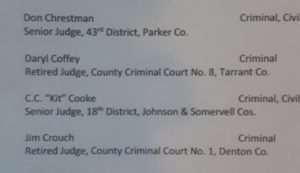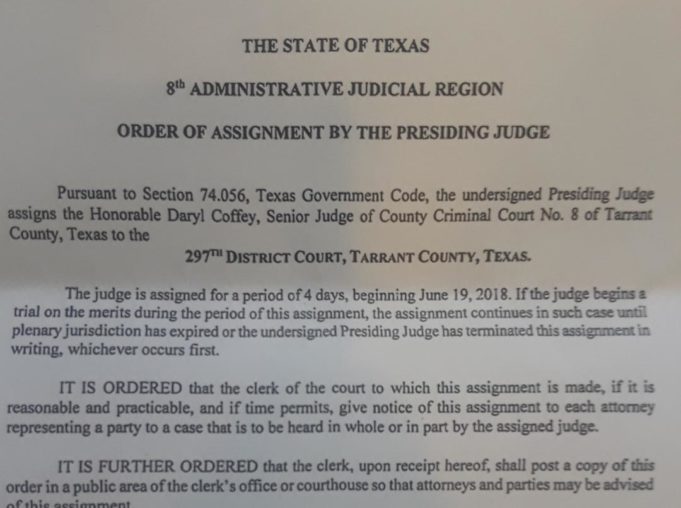With a Republican district attorney runoff weeks away and the murder trial of former Fort Worth police officer Aaron Dean set for June, the integrity of Tarrant County’s criminal justice system is understandably a topic of debate and scrutiny. Republican races continue to focus on supposed outsider meddling by leftist donors like George Soros and human traffickers, but our magazine’s research is uncovering a possible scam in Tarrant County’s courtrooms.
At issue is the judicial title of retired judge Daryl Coffey, who has falsely taken the title of senior judge for eight years with the blessing of Judge David Evans, the top administrator for the Eighth Administrative Judicial Region that includes Tarrant County.
Every year, Evans releases a public list of retired judges eligible for assignment throughout the region. Coffey was always correctly listed as a retired judge and not a senior judge, but based on the only two assignment orders released to me by Evans so far, the administrative judge has falsely assigned Coffey as a senior judge using a form — Order of Assignment — that is not made public.
Understanding why Evans would give Coffey the erroneous title of senior judge requires an examination of two chapters of Texas Government Code and a 1992 ruling by the Texas Court of Criminal Appeals. In Lone Star Industries, Inc. v. Ater, the top appeals court in the state ruled that retired Judge Gene Ater’s rulings before he was designated a senior judge were null and void.
“The judicial acts of a retired judge who has not met the statutory requirements to be an assigned judge at the time he purports to act are absolutely void,” the court wrote, adding that a retired judge is not a judicial officer until he or she obtains senior judge status from Texas Chief Justice Hecht.
Section 74.056 of the Texas Government Code, which Coffey applied and qualified for, sets standards and guidelines for retired judges who elect to be eligible for assignment by one of 13 administrative judges across the state, including Evans. Section 75.002, which Coffey never qualified for, sets rules for becoming a type of judicial officer known as a senior judge. A spokesperson for Hecht’s office told me that the chief justice never approved Coffey’s request for the title of senior judge, nor did Hecht’s office receive any documents or communications by Coffey requesting the title of senior judge.
“To be qualified, the retired judge must be a retiree … and must make the election required by Section 75.001,” the Court of Criminal Appeals ruled in 1992.

When asked about the eligibility of non-senior judges to be assigned by administrative judges, the Texas Commission on Judicial Conduct said that discussing such matters would effectively constitute legal advice, which it does not offer. A spokesperson with the State Bar of Texas, which disciplines attorneys, declined to comment and referred me to the Texas Commission on Judicial Conduct.
One government watchdog told me he knows why the only governmental agency tasked with enforcing judicial misconduct laws refuses to answer basic questions about what grounds qualify for judicial misconduct.
The Texas Commission on Judicial Conduct has strayed from its founding role as a proactive agency that holds judges accountable, said the watchdog, David Fisher, who has extensive experience consulting for defense attorneys on a range of topics that include judicial misconduct. Fisher added that the commission historically relied on attorneys to report judicial misconduct, but they now fear reporting any for fear of being blackballed from court-appointed assignments.
The 2001 Texas Fair Defense Act was supposed to end the use of judicial patronage when assigning attorneys to indigent defendants, but our recent reporting found that some Tarrant County judges allegedly bypass the state law frequently to assign taxpayer-funded cases to personal friends (“Following the ‘Plan,’ May 4).
Based on our research, Coffey has a history of falsifying government documents and misrepresenting his title and qualifications. On at least two government documents, Coffey described himself as a senior judge.
Coffey also failed to take the oath of office following retirement, meaning that he has not been constitutionally qualified to preside over any court proceeding since 2015. In Texas, any appointed or elected public official’s oath of office terminates once the official’s term ends. Coffey did file an oath near the end of his term of office that certified that he was qualified to continue service as a visiting retired judge, but that act does not qualify as taking the constitutional oath of office.
Following publication of our first story on Coffey (“Moonlighting as a Senior Judge?,” April 13), Evans canceled Coffey’s June assignment to the 297th District Court and transferred the job to retired judge Mollee Westfall, who recently lost her Republican primary bid for DA. In a recent letter, Evans told me Coffey was pulled due to a “scheduling conflict.”
An April 7 email shows that Judge David Hagerman, who presides over the 297th, was told that Coffey canceled for a different reason, this one being because the retired judge is moving. The email does not disclose who informed Hagerman, but the role of communicating with visiting judge assignments falls on Evans.
In an email, Coffey said that he never misrepresented himself as a senior judge and that he filed all his oaths as required by law. Judges Evans and Hagerman did not respond to requests for comment.
In 2018, Evans assigned Coffey as a senior judge to the 297th District Court at the request of Hagerman. Hagerman’s district court oversees felonies while Coffey’s career as an active judge solely dealt with ruling on DWI and other misdemeanor cases. During the 2018 trial that Evans assigned to Coffey, a jury found defendant Lee Smith guilty of failing to register as a sex offender and sentenced him to 75 years in prison. Smith appealed the verdict, and an appellate court ruled the following year that Smith’s argument — that Coffey failed to file his oath of office — was not sustained because Smith’s legal counsel failed to raise that objection at the time of the original trial, a burden that few defendants could reasonably have met.
The recent trial of former Justice of the Peace Jacqueline Wright will soon bring Coffey’s credibility and that of the Eighth Administrative Judicial Region before a criminal appeals court later this year. In 2019, DA Sharen Wilson sought the indictment of Wright for fraud. The former JP acknowledged that she failed to update her homestead exemption for the house she resided in but maintained that she corrected the problem and paid monies owed before her indictment. Wright alleges that the unprecedented charges by the DA’s public integrity unit were orchestrated by former Constable Jody Johnson, who recently lost his bid to inherit the Precinct 4 commissioners seat of his father, longtime commissioner J.D. Johnson, in a race that was largely seen as a referendum on decades of alleged public graft and corruption on the part of both members of the Johnson family (“Betting on the Good Old Boys,” Dec. 2021).
For Wright’s trial in January, Evans assigned Coffey as a senior retired judge to the district court of Robb Catalano. In early February, a jury found Wright guilty of tampering with a government document — the revised charge sought by the DA’s office, likely because not updating your homestead exemption is a civil matter only. Wright and her attorney did not know Coffey would be presiding over the case until the first day of court, a potentially intentional decision on the part of Evans that made it impossible for Wright’s legal team to know that Coffey was not constitutionally or statutorily qualified to preside over the case.
Evans and the judges who requested Coffey as a visiting retired senior judge may have allowed Coffey to misrepresent his status as a political favor to his wife, Debra Coffey, the longtime active member of the Texas Federation of Republican Women, former Board Member of the Fort Worth Republican Women, and former Tarrant County Republican precinct chair.
Visiting retired judges are paid on par with county and district court judges, meaning that Tarrant County reimbursed Coffey just under $500 a day for services over eight years that possibly defrauded local taxpayers.
Our ongoing investigation has implications for the upcoming June trial of former police officer Dean, who will stand trial for the murder of Atatiana Jefferson in Hagerman’s court. Based on documents forwarded by Evans through a formal request known as Rule 12, Hagerman requested Coffey to preside over felony cases in the 297th District Court on January, February, April, and August of 2021 and January, February, and June of this year. The scope of my request did not predate 2021.
Evans has stated his intention to release documents that will reveal each of Coffey’s assignments since retirement, evidence that may further tie Evans to an effort by powerful Tarrant County judges to falsify government documents as a possible favor to a well-connected Republican family.












